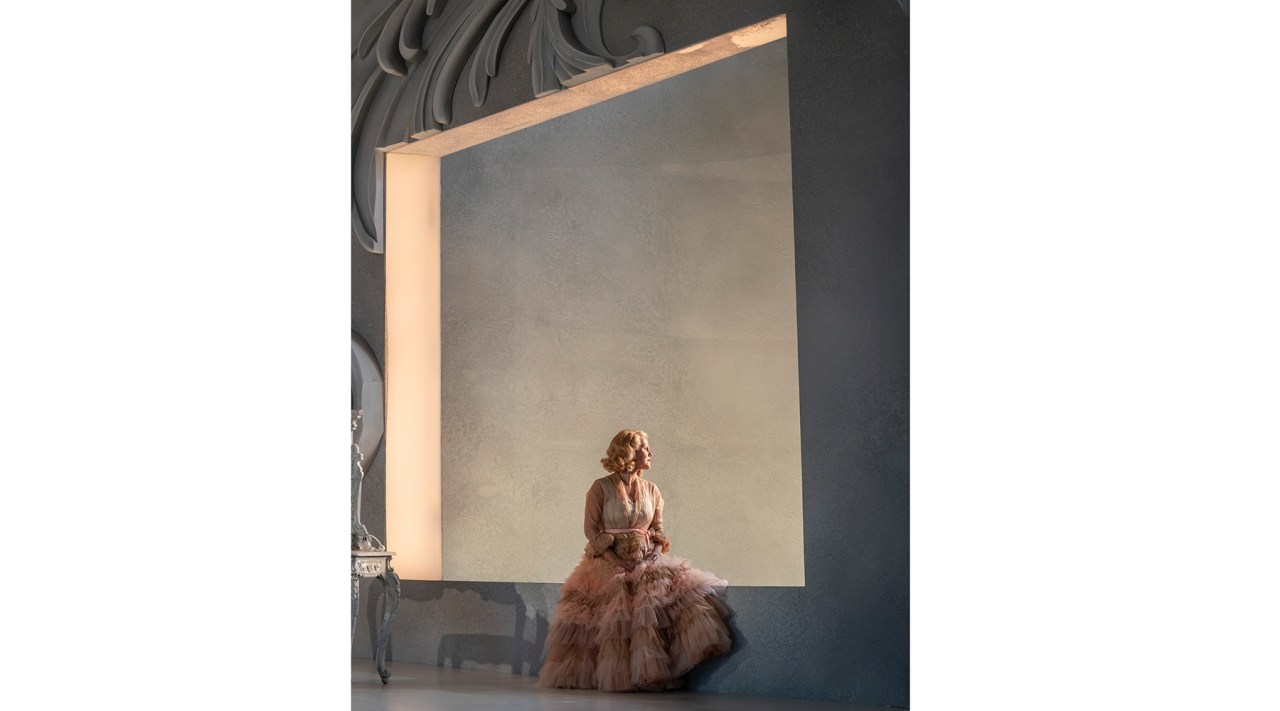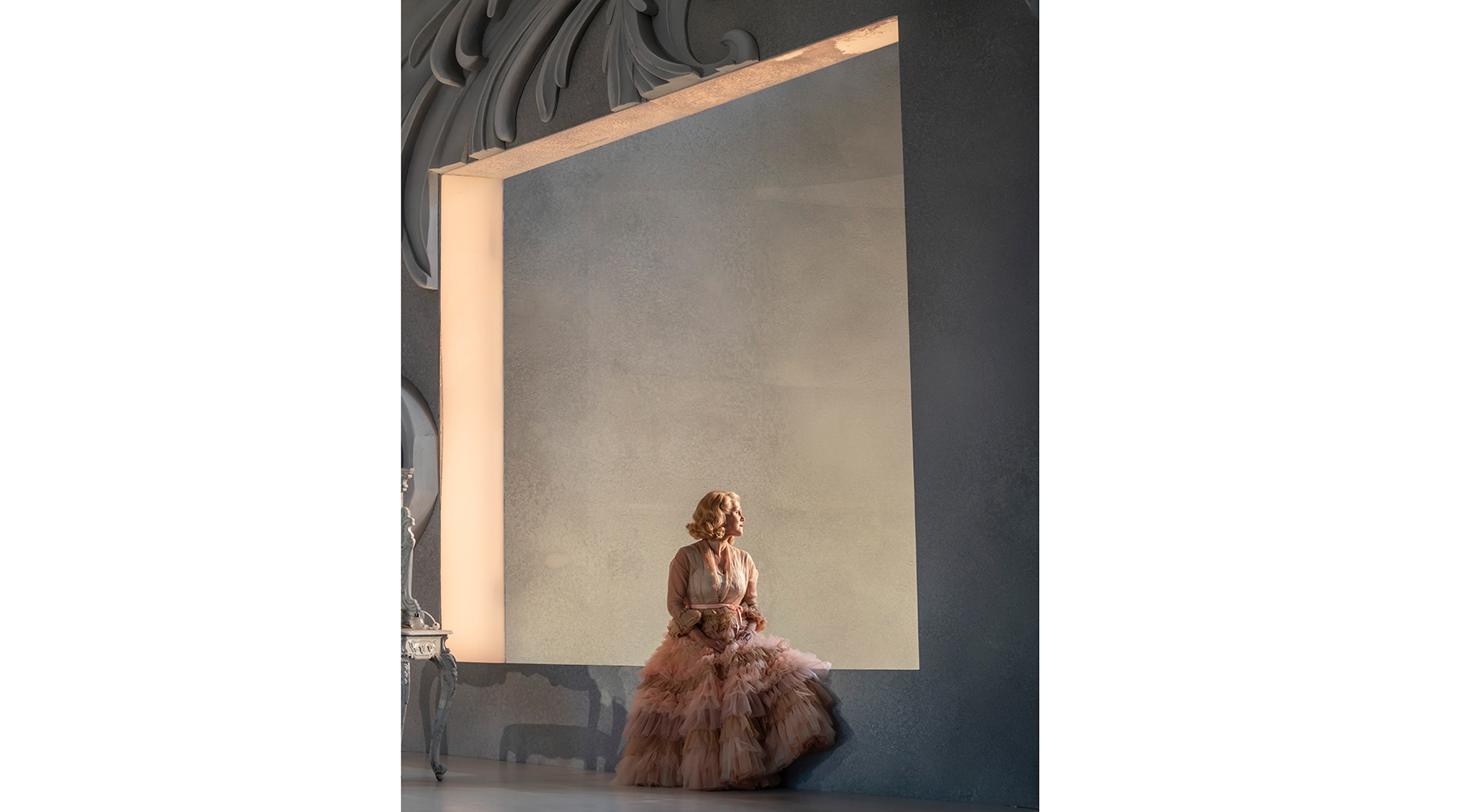At the turning point of Richard Strauss and Hugo von Hofmannsthal’s Der Rosenkavalier, all the clocks stop. Octavian has arrived at the house of the teenage bride-to-be Sophie von Faninal as bearer of the silver rose — the symbol of a love that is simultaneously as artificial and as eternal as any human creation can be. Sophie smells real roses; yes, says Octavian, there is a drop of Persian fragrance amid the silver petals. ‘Like a heavenly, not an earthly rose’, sings Sophie: and her voice soars higher and purer than anything we’ve heard so far, suspended in stillness while Strauss’s orchestra shimmers around her.
The thing is, in Bruno Ravella’s new staging for Garsington Opera we already know the rose’s secret. Back in Act One, Octavian’s noble lover the Marschallin (Miah Persson) has had a quick dab of the perfume for herself — triggering an extended meditation on her own vanished girlhood. The Marschallin’s monologue is often presented as the semi-tragic musing of some Sondheim-ish faded diva (Richard Jones, at Glyndebourne, put her on a therapist’s couch). Ravella’s little gesture makes it feel wholly unaffected. His Marschallin has already had her moment of blissful transcendence: a passing street singer pours out what Strauss and Hofmannsthal intended as a parody of a bel canto lovesong, but which, in this brief instant, visibly moves her. Persson wasn’t even singing at this point. Rapture, regret and amused self-knowledge crossed her face like the shadows of clouds on the Chiltern hillside beyond the theatre.
Ravella’s knack for delicately joining up reimagined details raises this production into something that sings
True, these were tiny moments in a four-hour drama. But Der Rosenkavalier is all about unspoken connections, and instants that contain eternities. Ravella’s knack for reimagining these details before delicately joining them up lifted a fairly straightforward production into something that sang. It’s updated, of course (in common with six out of the last seven Rosenkavaliers I’ve seen). We’re in a stylised postwar high society, all Dior couture and tailcoated bellboys. Imagine Grace Kelly checking into the Grand Budapest Hotel.
But there’s no particular agenda here, beyond an elegant and reasonably plausible setting for a comedy of manners, inhabited by vividly drawn characters. There’s Hanna Hipp’s Octavian: as boyish as you like, channelling all that youthful verve into rich-toned, thrillingly ardent singing (onstage distancing puts limits on physical passion). There’s Madison Leonard’s bouncy, debutante-ish Sophie, whose pearlescent soprano made a very believable vocal representation of a girl who believes she’s tumbled into a fairy tale, even after the rudest of comedowns. And of course there’s Persson, whose measured phrasing and ability to convey and then conceal intense emotion in the turn of a cadence was genuinely (and there’s no higher compliment in this role) aristocratic.
Against Persson’s subtlety, it made sense to present Baron Ochs as a cartoon, and after manspreading his way around the Marschallin’s boudoir like a carrot-topped gamecock, Derrick Ballard came right out and owned his vulgarity in Act Two. This is the kind of man who wears red socks to his own betrothal. That voice, though: a huge, full-bodied port-wine gravy of a bass-baritone, sloshed in great savoury glugs over every scene in which he appeared. If Ochs is wrong (and few operatic characters are more ripe for cancellation in our post-empathy era), he certainly sounded right. Ravella dealt playfully with another problem character: the Marschallin’s silent pageboy Mohammed becomes a mischievous Cupid in pink breeches. The little lad who played him, George Nearn Stuart, deserved a much bigger ovation.
Reservations? The malfunctioning set designs in Act Three look like a fiasco waiting to happen, and the orchestra has been reduced to 45 players. Actually — give or take some jarring splashes of piano (a tone-colour that Strauss took care to confine backstage in Der Rosenkavalier) — it sounded as lush as ever, with the conductor Jordan de Souza drawing animated playing from the Philharmonia before opening the floodgates in the final, cathartic Trio. Like the production as a whole, it exceeded expectations. Never a bad result, and if you end up dabbing your eyes; well, you can always blame it on hayfever.
Opera Holland Park has opened its season with a new Marriage of Figaro, a three quarter-staged romp energetically thrown together (complete with lilac periwigs and disco dancing) by director Oliver Platt. The cast perform on platforms around a scaled-down orchestra, and it works as well as opera in the round(ish) ever does. But there’s a lot of physical space to cover, which might explain why the comic timing felt a bit baggy. The set-up favoured performances on the boisterous side, of which Ross Ramgobin’s goofy, handsomely sung Figaro and Samantha Price’s endearingly cocky Cherubino stood out from a generally enjoyable cast.
First nights are rarely typical; the basic ingredients here are good and the mixture might well have started fizzing by now. If you can get a seat, don’t hesitate to go and see for yourself.
This article is free to read
To unlock more articles, subscribe to get 3 months of unlimited access for just $5








Comments
Join the debate for just £1 a month
Be part of the conversation with other Spectator readers by getting your first three months for £3.
UNLOCK ACCESS Just £1 a monthAlready a subscriber? Log in